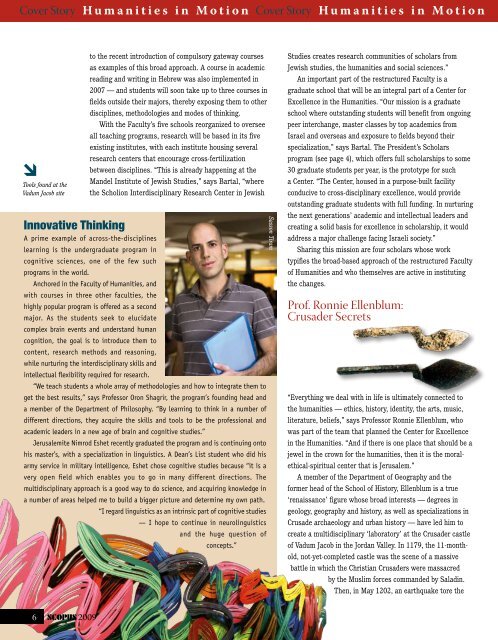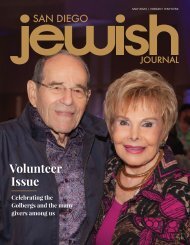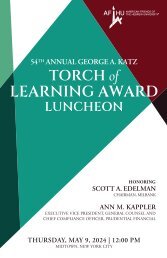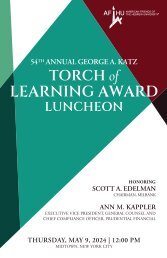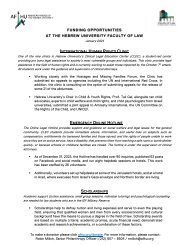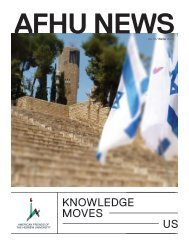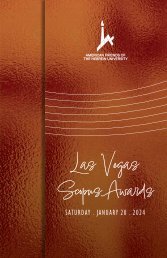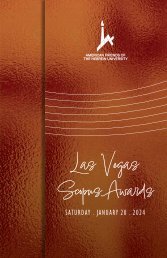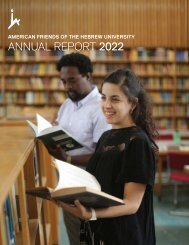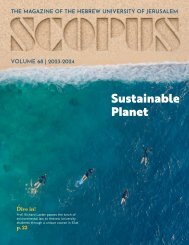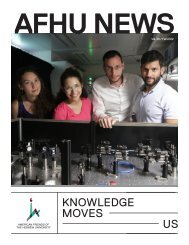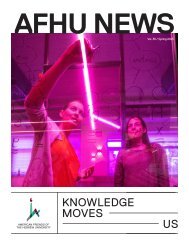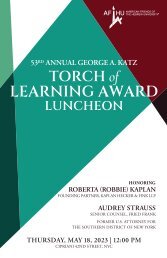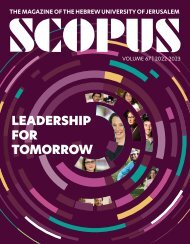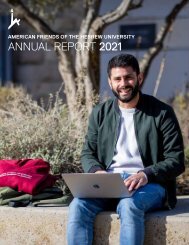Create successful ePaper yourself
Turn your PDF publications into a flip-book with our unique Google optimized e-Paper software.
Cover Story<br />
Humanities in Motion<br />
Cover Story<br />
Humanities in Motion<br />
Tools found at the<br />
Vadum Jacob site<br />
to the recent introduction of compulsory gateway courses<br />
as examples of this broad approach. A course in academic<br />
reading and writing in Hebrew was also implemented in<br />
2007 — and students will soon take up to three courses in<br />
fields outside their majors, thereby exposing them to other<br />
disciplines, methodologies and modes of thinking.<br />
With the Faculty’s five schools reorganized to oversee<br />
all teaching programs, research will be based in its five<br />
existing institutes, with each institute housing several<br />
research centers that encourage cross-fertilization<br />
between disciplines. “This is already happening at the<br />
Mandel Institute of Jewish Studies,” says Bartal, “where<br />
the Scholion Interdisciplinary Research Center in Jewish<br />
Innovative Thinking<br />
A prime example of across-the-disciplines<br />
learning is the undergraduate program in<br />
cognitive sciences, one of the few such<br />
programs in the world.<br />
Anchored in the Faculty of Humanities, and<br />
with courses in three other faculties, the<br />
highly popular program is offered as a second<br />
major. As the students seek to elucidate<br />
complex brain events and understand human<br />
cognition, the goal is to introduce them to<br />
content, research methods and reasoning,<br />
while nurturing the interdisciplinary skills and<br />
intellectual flexibility required for research.<br />
“We teach students a whole array of methodologies and how to integrate them to<br />
get the best results,” says Professor Oron Shagrir, the program’s founding head and<br />
a member of the Department of Philosophy. “By learning to think in a number of<br />
different directions, they acquire the skills and tools to be the professional and<br />
academic leaders in a new age of brain and cognitive studies.”<br />
Jerusalemite Nimrod Eshet recently graduated the program and is continuing onto<br />
his master’s, with a specialization in linguistics. A Dean’s List student who did his<br />
army service in military intelligence, Eshet chose cognitive studies because “it is a<br />
very open field which enables you to go in many different directions. The<br />
multidisciplinary approach is a good way to do science, and acquiring knowledge in<br />
a number of areas helped me to build a bigger picture and determine my own path.<br />
“I regard linguistics as an intrinsic part of cognitive studies<br />
— I hope to continue in neurolinguistics<br />
and the huge question of<br />
concepts.”<br />
Sasson Tiram<br />
Studies creates research communities of scholars from<br />
Jewish studies, the humanities and social sciences.”<br />
An important part of the restructured Faculty is a<br />
graduate school that will be an integral part of a Center for<br />
Excellence in the Humanities. “Our mission is a graduate<br />
school where outstanding students will benefit from ongoing<br />
peer interchange, master classes by top academics from<br />
Israel and overseas and exposure to fields beyond their<br />
specialization,” says Bartal. The President’s Scholars<br />
program (see page 4), which offers full scholarships to some<br />
30 graduate students per year, is the prototype for such<br />
a Center. “The Center, housed in a purpose-built facility<br />
conducive to cross-disciplinary excellence, would provide<br />
outstanding graduate students with full funding. In nurturing<br />
the next generations’ academic and intellectual leaders and<br />
creating a solid basis for excellence in scholarship, it would<br />
address a major challenge facing Israeli society.”<br />
Sharing this mission are four scholars whose work<br />
typifies the broad-based approach of the restructured Faculty<br />
of Humanities and who themselves are active in instituting<br />
the changes.<br />
Prof. Ronnie Ellenblum:<br />
Crusader Secrets<br />
“Everything we deal with in life is ultimately connected to<br />
the humanities — ethics, history, identity, the arts, music,<br />
literature, beliefs,” says Professor Ronnie Ellenblum, who<br />
was part of the team that planned the Center for Excellence<br />
in the Humanities. “And if there is one place that should be a<br />
jewel in the crown for the humanities, then it is the moralethical-spiritual<br />
center that is Jerusalem.”<br />
A member of the Department of Geography and the<br />
former head of the School of History, Ellenblum is a true<br />
‘renaissance’ figure whose broad interests — degrees in<br />
geology, geography and history, as well as specializations in<br />
Crusade archaeology and urban history — have led him to<br />
create a multidisciplinary ‘laboratory’ at the Crusader castle<br />
of Vadum Jacob in the Jordan Valley. In 1179, the 11-monthold,<br />
not-yet-completed castle was the scene of a massive<br />
battle in which the Christian Crusaders were massacred<br />
by the Muslim forces commanded by Saladin.<br />
Then, in May 1202, an earthquake tore the<br />
6 <strong>2009</strong>


